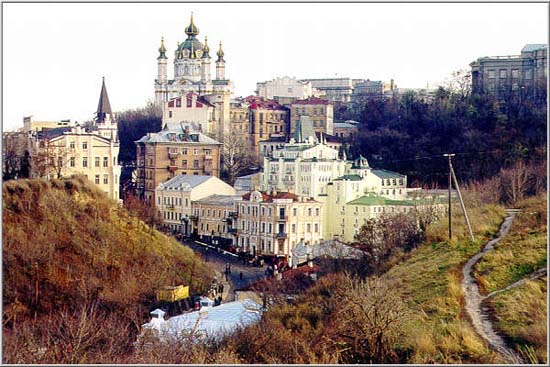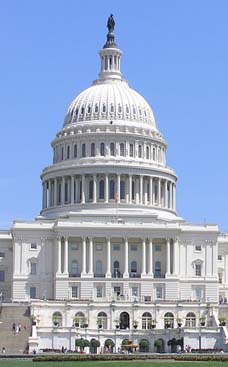
While the Russians have the stability and economic might to keep one foot in Asia and the other in Europe and leave the question of their identity unanswered, Ukraine does not. Squeezed between the E.U. and the former U.S.S.R., Ukraine, as a developing nation, will fall under the sphere of influence of one of these giants; as Ukraine develops, it will need a senior partner in the process. Ukraine must decide where to look for this partner: East or West. Westerners saw Yushchenko’s victory in the Orange Revolution as Ukraine’s choice of the latter over Russia. Nearly two years later, with Viktor Yanukovych serving as Prime Minister—a man with close ties to Moscow and whose 2004 presidential campaign was publicly supported by Putin himself—it seems this was an oversimplification. Ukrainians are very much conflicted about which direction their country should be heading. The language struggle in Ukraine is symbolic of the struggle for the future of Ukraine. The central government is pushing for more Ukrainian (a rejection of the Soviet Union’s legacy, linguistically closer to Polish) yet a large contingent of the population clings to Russian (a remnant of Russian imperialism). In deciding what language we speak, PCVs take part in this struggle. Of course in some regions, Crimea and the Lviv area for example, this struggle is not present. But throughout the majority of the communities in Ukraine, language is a contested issue. Although we are apolitical and should not pick sides in this struggle, Peace Corps has a responsibility to send Ukrainian speaking volunteers to these communities where the language question is contested.
Peace Corps Volunteer Ben Hanes writes: The Importance of Speaking Ukrainian
The Importance of Speaking Ukrainian
Ben Hanes
TEFL XXIX, Velyka Lepetykha
In his epic poem “The Scythians” Russian poet Alexander Blok, addressing the nations of Europe, ponders the riddle of Russia:
Yes, Russia is a Sphinx. Exulting, grieving,
And sweating blood, she cannot sate
Her eyes that gaze and gaze and gaze
At you with stone-lipped love and hate. (1)
This schizophrenic attitude toward Europe—loving and hating it at once—tells of a deeper conflict in the Russian soul: the ambiguity of Russian identity. That is, does Russia belong to Europe or Asia? This lack of a concrete identity, this “in-between-ness,” is an important part of the Russian psyche that can be traced back centuries through Russian art. To this day Russia struggles with this dilemma.
To the extent that Ukraine shares history with Russia, it also shares in this ambiguous identity. The “geographic center” of Europe may be in Ukraine, but historical ties to Russia link Ukraine with Asia as well. During the Kievan Rus’ period (where Russian and Ukrainian history intersect), Genghiz Khan’s Mongol hordes conquered most of present-day Russia and Ukraine. Kievan Rus’ was the only major European power to be overtaken by the Asiatic hordes(2), an event that would bring the influence of Asian culture and Asian blood to the region and contribute to this confused identity.
While the Russians have the stability and economic might to keep one foot in Asia and the other in Europe and leave the question of their identity unanswered, Ukraine does not. Squeezed between the E.U. and the former U.S.S.R., Ukraine, as a developing nation, will fall under the sphere of influence of one of these giants; as Ukraine develops, it will need a senior partner in the process. Ukraine must decide where to look for this partner: East or West.
Westerners saw Yushchenko’s victory in the Orange Revolution as Ukraine’s choice of the latter over Russia. Nearly two years later, with Viktor Yanukovych serving as Prime Minister—a man with close ties to Moscow and whose 2004 presidential campaign was publicly supported by Putin himself—it seems this was an oversimplification. Ukrainians are very much conflicted about which direction their country should be heading.
The language struggle in Ukraine is symbolic of the struggle for the future of Ukraine. The central government is pushing for more Ukrainian (a rejection of the Soviet Union’s legacy, linguistically closer to Polish) yet a large contingent of the population clings to Russian (a remnant of Russian imperialism).
In deciding what language we speak, PCVs take part in this struggle. Of course in some regions, Crimea and the Lviv area for example, this struggle is not present. But throughout the majority of the communities in Ukraine, language is a contested issue. Although we are apolitical and should not pick sides in this struggle, Peace Corps has a responsibility to send Ukrainian speaking volunteers to these communities where the language question is contested.
I bring this up because of an alarming statistic brought to my attention by my regional manager. When asked in what language future volunteers sent to their sites should be trained, all of the Ukrainian-speaking volunteers in my region, save one, answered “Russian.” To those Ukrainian speakers in mixed communities who wish they spoke Russian, and to the staff in Kyiv considering sending Russian speakers to these sites, I urge you to consider the following.
The Supreme Rada declared Ukrainian the national language, but in many communities it is losing out to Russian. As guests of the Ukrainian government, we should not hinder its agenda. This is exactly what we do when we send Russian-speaking volunteers to mixed communities; we work against the government’s goal of implementing Ukrainian as the national language. We ought not treat our hosts like that.
The language that a PCV speaks, especially in small villages, affects the locals’ perception of that language. Many Ukrainians are embarrassed by their language, considering it an inferior “farmer’s language.” When Americans speak Ukrainian, it helps dispel this myth and helps Ukrainians feel proud of their mother tongue.
Many volunteers want to learn Russian because it is an international language that will be useful to them after Peace Corps. But we must remember we are here for the benefit of Ukraine first; our personal goals should take a back seat to what is best for Ukraine. Still, learning Ukrainian will make learning Russian in the future much easier (the alphabet and grammar are almost identical, cognates are abundant). If you learn Ukrainian well during your service, picking up Russian in the future will be a cinch. Think of it as linguistic cross-training.
Some will argue that in mixed communities most people speak Russian, making life for PCVs who learned Ukrainian unfairly difficult. While this may be true at some sites, remember: the grass is always greener on the other side of the linguistic barrier. Imagine how much you would struggle to understand the Ukrainian speakers if you knew only Russian. Besides, most people don’t speak pure Russian or Ukrainian, they speak surzhik. In communities like these, if you want to be able to understand everyone, you will have to have to know a bit of both languages. Fortunately once you get a few high-frequency words down, understanding conversational Russian is easy.
I am not saying that Ukrainians will be better off if they cast their lot with the Europeans—their cultural and historical ties to Russia run deep, and completely disregarding this relationship would be a mistake. But no matter what direction Ukraine looks to it must remain autonomous, and developing the Ukrainian language is key to developing Ukrainian autonomy. Peace Corps should remember this when making decisions regarding language.
1- Orlando Figes, Natasha’s dance: a cultural history of Russia. Picador, 2002. p. 419
2- Ibid., p. 366


















